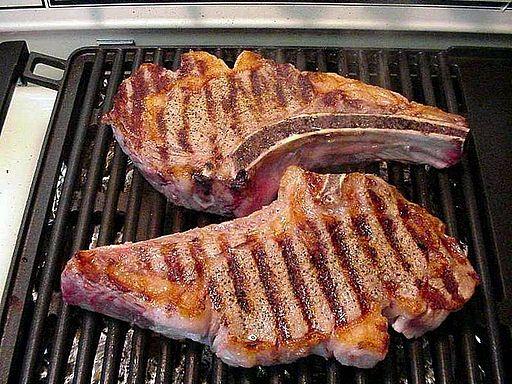From the same dataset that brought you the information that vegetarian mothers create drug-addled children, we learn that vegetarian men are more depressed than their meat-eating brothers. The study, Vegetarian diets and depressive symptoms among men, is in the Journal of Affective Disorders.
That dataset, Avon Longitudinal Study of Parents and Children (ALSPAC), has over 9,000 men self-reporting on their eating habits. This study looked at the 350 self-identified vegetarians in their midst. These men completed a survey including a set of measures on depression at roughly the 18th week of their spouses’ pregnancy. Vegans were lumped in with vegetarians because of their small numbers. The researchers found that vegetarian men were more likely, with an odds ratio of 1.71 (that is a 70% increased risk) to be depressed. The authors say they accounted for a range of sociodemographic factors including family history, prior childhood psychiatric contact, educational level, number of children at home, marital and employment status, alcohol and tobacco use and educational level. The longer time an individual had been a vegetarian did not correlate, at least at a statistical significance, with depression. [1]
So what did? They listed multiple nutrient interactions:
- Nuts high in omega-6 fatty acids – associated with depression
- Depressive people are more likely to change their dietary preferences
- High levels of phytoestrogens and pesticide metabolites – endocrine disruptors from those pesky vegetables and soy
- Lower amounts of omega-3 fatty acids - presumably the vegetarians did not eat seafood
- Lower red meat consumption - may result in lower Vitamin B-12 levels [2]
Which led them to state plainly, “It is possible that for some proportion of the population, vegetarianism is not chosen for health, religious or ethical reasons, but is a marker for other psychiatric disorders manifesting with symptoms of both eating disorders and depressive symptoms.”
It is unclear whether the authors of this study had a chance to review the work on vegetarian mothers creating substance abusing children. Perhaps the fathers were depressed because of how the children turned out?
The authors did indicate the study’s limitations, including the fact that no nutrient or pesticide levels were actually evaluated, that multivariable analysis can misrepresent or hide relationships and that reverse causality, that being depressed makes you switch to a vegetarian diet, could be an explanation. As is always they case, they use this as a plea for more funding with the classic “more study is necessary,” such as a “randomized placebo-controlled trial … to determine whether depressive symptoms among vegetarians can be reduced by supplementing with folic acid and other B vitamins.”
If only supplements could help, it would be a true ‘have your cake and eat it too’ situation or, as the authors hope, supplements might allow vegetarians “the benefits of better health, and harmony with ethical and cultural beliefs, while reducing risks of depressive symptoms.”
The author acknowledges a conflict of interest in that he continues to enjoy steak.
Footnotes:
[1] Does this mean that even a few vegetarian days are sufficient to cause depression?
[2] The authors cite a study of 1,046 Australian women where lower red meat consumption was associated with nearly a doubling of risk for major depressive and anxiety disorders.




